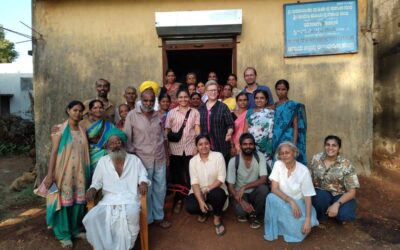A still from Meenakshi Devi’s classroom
My anticipation from the first field visit during our induction training was largely based on my stereotypes of villages. Chimamanda Ngozi Adichie puts this across eloquently in her TedTalk ‘The Dangers of a Single Story’ She points out that the risk of having a rigid perspective is that it can lead us to default assumptions, conclusions and decisions that may be uninformed. With this as a background, I headed to Jatara* (a village in Udaipur, Rajasthan) assuming that the locals are probably going to be regressive and unwelcoming because we (my co-fellows and I) are strangers walking into their homes and asking them questions that they aren’t obliged to answer.
Meenakshi Devi*, a 61 year old teacher proved me wrong as soon as we walked into her school that she has been running for the past 35 years in Jatara. She welcomed us, fed us wholeheartedly and didn’t allow to leave anything. So we packed the extra food for our day ahead. The kind of warmth and love we received from her was something I haven’t experienced even in spaces that are familiar to me.
One just has to trust in the goodness of people.
She was curious to know about us and enthusiastic to share with us her story, where she comes from, the struggles she has had, the kind of resilience it took to overcome them and her perspectives on societal issues. I remember her telling us that her daughter fell in love with a part Punjabi, part Muslim boy which she mentioned is clearly against the Brahmanical ideology of marriage and partnership. She briefly spoke about the backlash that their family had to face after the wedding. But her belief was that the loss would be much greater had her daughter decided to run away and disconnect with the family.
My respect for her shot up another notch because she put her child’s happiness before societal norms. Something about this entire incident felt reassuring and hopeful.
Another striking part of the conversation was when she told us that she met with a grave accident that almost caused her to get her legs amputated, and how she dealt with the situation. It wasn’t acceptable to her, and her determination to have healthy legs in place was strong. After a long treatment of 6-8 months, she finally came back to what she loved doing the most – teaching.
Amidst all her stories of personal loss, financial instability and physical injuries, we couldn’t help but feel sorry for her and her family but she wasn’t looking for sympathetic nods. However, all she wanted was for us to learn that in times of crisis, there’s nothing else to do but push.
The way she strived to look at the brighter, bigger picture every single time is something that I would want to imbibe and carry forward when hardships arrive at my doorstep.
Meenakshi ji invited us into this small room inside school that had written records of children and their learning material. There also stood a larger than life painting of Rana Pratap Singh that was made by her husband. The room was an ode to him with things he is passionate about. Paintings and portraits dating back to independence, a picture of Bhagat Singh to serve as a constant reminder that an individual can have the power to stand up against injustice, writings of Gandhi and an old radio system playing music from the 70s to make the space more lively.

For me, the highlight of the room was a frame hanging by the wall that said “Hairat hai ki log jeevan ko badhana chahte hai, sudharna nahi.” That perfectly captures the essence of the person Meenakshi ji is. She is constantly working to make everyone’s life around her better, including her own. After interacting with us and showing us the school, off she went on her scooter realising that there were other priorities to get to before she’s at school again the next day.
Also read: A Chatty Charmer And An M.Com Graduate by Akshatha, my co-fellow who accompanied me to Jatara
It didn’t take long before the single stories that I was carrying became fuzzy and irrelevant. So many people that we met, spoke proudly about their daughters working in Bangalore and Mumbai, contributing financially at home. A lot of them had completed their PhDs, some with excellent oratory skills worked for radio shows like Aakash Vani, and a few are completing their B.Ed (they were taught by Meenakshi ji in school and got inspired by her line of work).
To quote Chimamanda, “The single story creates stereotypes, and the problem with stereotypes is not that they are untrue, but that they are incomplete. They make one story become the only story.” Each life contains a heterogeneous compilation of stories and I can only hope to unlock these as the fellowship journey progresses. Can’t wait to find out what the next 18 months have in store for me!
*Names changed to maintain confidentiality




0 Comments